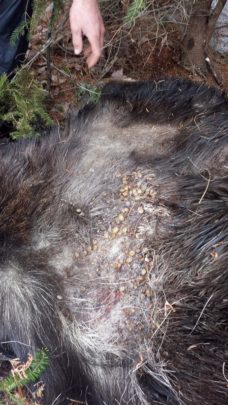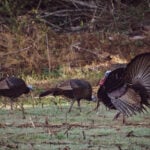The moose of Maine are disappearing. Throughout the state, the young and adults alike can be seen stumbling through the woods clothed with big hairless patches, bodies emaciated and tired, and eventual death certain to follow. So what’s causing a 1,300 pound animal this distress? It may surprise you – the winter tick.
In an article published in National Geographic this month, author Christine Dell’Amore dives deep into the story of this iconic symbol of the north woods and why they are disappearing. Not just in Maine either, all of New England is sharing the same results.
Biologists believe the cause of these fatalities can be directly linked to climate change. The shorter, warmer winters are giving the ticks that thrive in this area of North America longer life while sending moose to an early grave.

This moose likely died from the effects of the thousands of ticks clinging to its skin.” Photograph courtesy of Maine’s moose project staff & National Geographic.
As many as 75,000 – 100,000 ticks can latch on to a single moose, causing severe blood loss and trauma to vital organs. Tired and sick, the animal’s body eventually invades itself, stripping the bone marrow, muscle tissue, and even the heart for protein.
Calves are the most susceptible. In 2014, 30 moose from Maine were radio-collared. The winter tick outbreak was so severe that year however, that 22 of the 30 died.
Collared moose news from 2015 has been no better, where 21 of the 35 calves have been found dead. All of these dead moose have had the same thing in common, being riddled with ticks.
According to the article, it’s unclear to whether or not ticks are the only reason for the high mortality rates of Maine’s moose over the past two decades. However, nearly all the scientists working on the cause agree that the ticks are likely the gateway for all other parasites found in the deceased animals.
Concerned over the disappearing moose and what it would do to Maine’s economy, government agencies are funding a multi-year research project in hopes of finding a solution to the problem.
“People come to Maine, they want to eat lobster,” says area moose biologist Lee Kantar, “but they want to see moose.”






